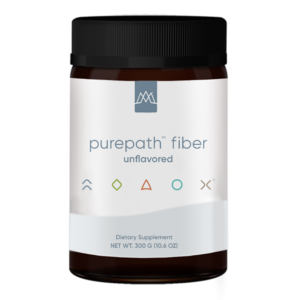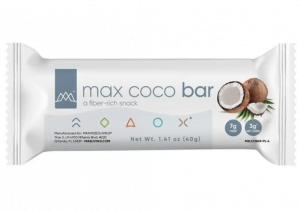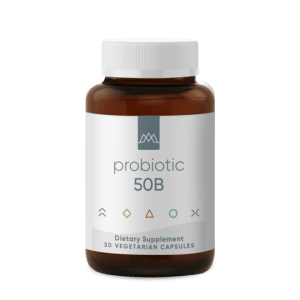If you’ve purchased yogurt, you’re likely aware that this popular food contains healthy bacteria called probiotics. Fermented foods such as yogurt contain these healthy live bacteria, which provide benefits for your gut and beyond.
Probiotics are different from prebiotics, which feed the healthy bacteria or probiotics that already reside in your gut. Put another way: Prebiotics are the food that probiotics need to thrive and provide their many health benefits.[1]
Probiotics: Keeping The Gut Balanced
Within your gut exists a staggering 100 trillion bacteria. Among their duties, these hardworking bacteria metabolize nutrients, protect the gut barrier against infections, and produce some nutrients including vitamin K. They may even play a role in some diseases.[2
A healthy gut has a balance of good and bad bacteria. When imbalances in gut bacteria occur –– such as too many bad bacteria and not enough good bacteria –– a condition called dysbiosis occurs. Left unchecked, dysbiosis can lead to digestive issues such as irritable bowel syndrome, but also allergies, mental health problems, obesity, and more.[3]
An unhealthy diet, high in sugar and processed foods, can create these imbalances. So can environmental toxins, overusing antibiotics, and stress. As a result, harmful species can overgrow, harming the gut but also the entire body. Too much harmful bacteria, for instance, may mean you may absorb more calories from food.[4] Probiotics can help restore that balance of bacteria to help the gut maintain the right amount of good bacteria.
One of the most-studied benefits of probiotics is for diarrhea that can occur after someone uses antibiotics. Antibiotics destroy many gut bacteria, including good ones. Ove time, that can create imbalances in gut bacteria and allow bad bacteria to overgrow.[5]
Probiotics can support other gut-related problems, too. Healthy gut bacteria can reduce the gas, bloating, constipation, and diarrhea associated with digestive disorders such as irritable bowel syndrome (IBS).
The benefits of probiotics go beyond gut health, however. About 70 percent of the immune system is in the gut.[6] Probiotics can directly destroy pathogens, enhance the response of the gut’s immune system, and protect against infections.[7]
What impacts the gut goes on to impact other organs, including the skin and brain. Probiotics may improve skin conditions, including acne and wound healing.[8] They show the potential to address brain disorders such as anxiety and depression.[9]
Prebiotics: A Source of Dietary Fiber and More
Prebiotics are a type of fiber that feeds the healthy bacteria or probiotics in your gut. Prebiotics include inulin, fructooligosaccharides (FOS), and resistant starch.
 As a whole, dietary fiber can support many conditions including heart health, weight management, immune function, and colon health. Most people get less than half of the recommended amounts of fiber.[10] A supplement can help meet those needs to give you all of fiber’s benefits. Many fiber supplements contain just one type of fiber, whereas many foods contain a combination of fibers.
As a whole, dietary fiber can support many conditions including heart health, weight management, immune function, and colon health. Most people get less than half of the recommended amounts of fiber.[10] A supplement can help meet those needs to give you all of fiber’s benefits. Many fiber supplements contain just one type of fiber, whereas many foods contain a combination of fibers.
We created PurePath™ Fiber to match the fiber you get in food. This unique formula combines 12 types of fiber –– including prebiotic fibers –– from vegetables, roots, seeds, and tree extracts. PurePath™ Fiber is unflavored and comes in a convenient powder that mixes easily in a smoothie or any liquid.
Like other types of fiber, prebiotics resists digestion. Instead, they travel to the colon, where healthy bacteria or probiotics ferment prebiotics.
This process generates short-chain fatty acids, which provide the colon energy. These fatty acids also support the gut barrier, metabolism, the immune system, and the body’s inflammatory response.[11] They can reduce the risk of obesity, heart disease, diabetes, and other diseases.[12]
Prebiotics can also:
- Enhance absorption of minerals such as calcium [13]
- Promote fullness and help you lose weight[14]
- Help reduce the risk of colon cancer[15]
A few foods are high in prebiotics, including:
- Dandelion greens
- Onions
- Garlic
- Leeks
- Asparagus
- Jerusalem artichoke
![]()
 Some of these are allium vegetables, which offer other health benefits. Even if you’re regularly eating these foods, you might not be getting enough prebiotics to support the healthy gut flora.
Some of these are allium vegetables, which offer other health benefits. Even if you’re regularly eating these foods, you might not be getting enough prebiotics to support the healthy gut flora.
We’ve created a convenient, delicious way to get these prebiotics. Max Coco Bar has a dark chocolate coating and moist, creamy coconut filling. Along with natural, healthy fat from coconut and cocoa butter, each Max Coco Bar packs seven grams of fiber, including prebiotic fiber from inulin and larch arabinogalactan. Meeting your prebiotic and fiber requirements never tasted so decadent!
3 Ways to Get More Prebiotics and Probiotics
Prebiotics and probiotics work together to support a healthy gut. Some foods such as sauerkraut called synbiotic foods, offer prebiotics and probiotics[16] Three simple dietary upgrades ensure you get the right amounts of probiotics as well as the prebiotics that support these healthy gut bacteria.
- Eat more fermented foods. Humans have fermented foods for centuries. Beyond preserving food, fermentation increases various species of good bacteria as well as other nutrients such as beneficial enzymes and B vitamins.[17] If you tolerate dairy, look for no-sugar-added kefir or Greek yogurt. Other fermented food options including sauerkraut and kimchi.[18]
- Consume more vegetables. Many plant foods in our Core and Advanced Plans contain prebiotics as well as other important nutrients to support healthy gut bacteria. Our Asparagus Frittata recipe packs two prebiotic-rich foods –– asparagus and onions –– into an easy-to-make, delicious meal.
- Take a probiotic supplement. Most of us don’t eat fermented foods regularly. They might not be staples of your diet, or you might not care for their taste or smell. Even if you do, you might not get the number of probiotics you need to support gut health and more. Among its benefits, a probiotic supplement can balance gut bacteria and enhance the immune system.[19]
 With probiotics, quality matters. Supplements have many barriers, including shelf life and surviving an acidic environment. That’s why we created Probiotic 50B, a broad-spectrum supplement that supports healthy gut bacteria.
With probiotics, quality matters. Supplements have many barriers, including shelf life and surviving an acidic environment. That’s why we created Probiotic 50B, a broad-spectrum supplement that supports healthy gut bacteria.
Probiotic 50B contains a diverse blend of the most highly-researched probiotics, delivered in a moisture-resistant capsule featuring delayed-release technology so your body will absorb it when it needs it the most.
In just one capsule, you get the most effective probiotic strains in their correct doses and delivery to restore gut bacteria, support immune and gut health, and more. Probiotic 50B is non-GMO, dairy-free, and gluten-free.
References
[1] https://www.healthline.com/nutrition/probiotics-and-prebiotics#section1
[2] https://www.health.harvard.edu/staying-healthy/can-gut-bacteria-improve-your-health
[3] https://www.medicinenet.com/probiotics/article.htm
[4] https://www.ncbi.nlm.nih.gov/pmc/articles/PMC3127503/
[5] https://www.healthline.com/nutrition/probiotics-101#digestive-health
[6] https://www.ncbi.nlm.nih.gov/pmc/articles/PMC2515351/
[7] https://www.karger.com/Article/FullText/496426
[8] https://www.sciencedirect.com/science/article/abs/pii/S0190962214014078
[9] https://annals-general-psychiatry.biomedcentral.com/articles/10.1186/s12991-017-0138-2
[10] https://www.ncbi.nlm.nih.gov/pmc/articles/PMC3705355/
[11] https://pubmed.ncbi.nlm.nih.gov/29027814/
[12] https://pubmed.ncbi.nlm.nih.gov/26925050/
[13] https://www.medicalnewstoday.com/articles/323490#benefits-and-side-effects-of-prebiotics
[14] https://www.ncbi.nlm.nih.gov/pmc/articles/PMC3705355/
[15] https://www.ncbi.nlm.nih.gov/pmc/articles/PMC2635701/
[16] https://www.healthline.com/nutrition/probiotics-and-prebiotics#section5
[17] https://www.health.harvard.edu/staying-healthy/how-to-get-more-probiotics
[18] https://www.healthline.com/nutrition/11-super-healthy-probiotic-foods


